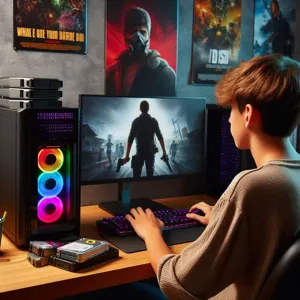In the exhilarating world of gaming, where epic adventures and immersive experiences await, the last thing you want is to lose your hard-earned progress or valuable game files due to unforeseen circumstances.
Whether it’s a sudden hardware failure, an unexpected power surge, or a pesky malware attack, the risks to your gaming PC are all too real. That’s why understanding how to safely back up your gaming PC is not just a precaution—it’s an essential step toward ensuring ultimate peace of mind. In this comprehensive guide, we’ll explore the best practices for backing up your games, configurations, and essential data, empowering you to safeguard your digital treasures and enjoy uninterrupted gaming sessions. From choosing the right backup solutions to step-by-step instructions on executing the perfect backup strategy, we’ve got you covered. Dive in and discover how to protect your gaming universe so you can focus on conquering virtual realms without a worry in the world!
1. Introduction: Why Backing Up Your Gaming PC is Crucial

In the fast-paced and immersive world of gaming, losing your hard-earned progress, custom builds, or meticulously crafted mods can feel like losing a part of yourself. The thrill of leveling up, the satisfaction of completing a challenging quest, and the joy of sharing your gaming achievements with friends are all memories that deserve to be preserved. This is where the importance of backing up your gaming PC comes into play.
Backing up your gaming PC is not just a precaution; it’s a vital practice that can save you from heartache and frustration. Hardware failures, accidental deletions, corrupt files, or even malware attacks can strike at any time, often without warning. Imagine spending weeks perfecting your character, only to find that your files have vanished due to a sudden system crash. The emotional toll is real, and the time lost is irreplaceable.
Moreover, the gaming landscape is ever-evolving. Updates, expansions, and new games frequently push the boundaries of what our systems can handle. Regularly backing up your data ensures that you’re prepared for any unforeseen circumstances that may arise during these transitions. It allows you to explore new gaming experiences with confidence, knowing that your previous achievements are safe and sound.
In this essential guide, we will delve into the various methods and best practices for backing up your gaming PC effectively. Whether you’re a casual gamer or a dedicated enthusiast, taking the time to implement a solid backup strategy will provide you with ultimate peace of mind, enabling you to focus on what matters most: the game itself. Let’s dive into the reasons why backing up is crucial and explore how you can safeguard your gaming legacy.
2. Understanding Different Types of Backups
When it comes to safeguarding your gaming PC, understanding the different types of backups is crucial for ensuring that your data remains secure and easily retrievable. Backups can be broadly categorized into three main types: full backups, incremental backups, and differential backups, each with its own advantages and ideal use cases.
**Full Backups** are the most comprehensive approach. This method involves copying all of your files and system settings to a backup location. While full backups provide a complete snapshot of your system at a specific point in time, they can be time-consuming and require significant storage space. However, their thoroughness means that restoring your system is a straightforward process, making them an excellent choice for your initial backup.
**Incremental Backups**, on the other hand, are designed for efficiency. This method saves only the data that has changed since the last backup, whether that was a full backup or another incremental backup. This approach conserves storage space and reduces the time needed for each backup session. However, restoring from incremental backups can be more complex, as you’ll need the last full backup along with all subsequent incremental backups to piece together your files correctly.
Lastly, **Differential Backups** strike a balance between the two. Like incremental backups, they only save the changes made since the last full backup. However, unlike incremental backups, each differential backup captures all changes since the last full backup, making the restoration process simpler. While they require more storage than incremental backups, they are generally quicker to restore, making them a solid choice for regular maintenance.
Incorporating a combination of these backup types into your routine can provide ultimate peace of mind. For instance, you might start with a full backup of your gaming PC, followed by weekly incremental backups to keep your data up to date. Periodically, you could perform differential backups to streamline your restoration process. Understanding these methods allows you to choose the best strategy tailored to your gaming habits and data needs, ensuring that all your precious game saves, custom settings, and cherished files are protected against unforeseen disasters.
3. Identifying What to Back Up on Your Gaming PC

When it comes to backing up your gaming PC, understanding what to prioritize is crucial for a seamless experience. While it might be tempting to hit the “select all” button and back up everything on your hard drive, a strategic approach will save you time and storage space. Here’s a breakdown of what you should focus on to ensure your gaming experience remains intact.
**Game Saves and Profiles**: Your game saves and profiles are often the most irreplaceable components of your gaming library. Whether you’ve spent countless hours leveling up in an rpg or meticulously crafted your character in a simulation game, losing your progress can be devastating. check for cloud save options offered by platforms like Steam, Origin, or Epic Games. If local backups are necessary, locate your game save files, which are typically found in the game’s directory or in your Documents folder, and back them up on an external drive or cloud storage.
**Installed Games**: While reinstalling games can be straightforward, downloading large files can be time-consuming and frustrating. Consider backing up your game installation files, especially for those you play frequently or are particularly large. Many game launchers have built-in features to manage local backups or allow you to copy the installation folder directly.
**Game Settings and Configurations**: Don’t forget about your personalized settings, including graphics tweaks, key bindings, and control configurations. These adjustments may take time to set up again, so exporting these settings, if possible, can save you a significant amount of hassle when you restore your system.
**Important Files and Documents**: Beyond games, consider backing up any essential documents related to your gaming, such as mods, custom maps, and scripts. If you’re part of a gaming community or have created content, those files are valuable and deserve protection.
**System and Software Configurations**: Finally, take a moment to back up your system settings, including drivers, software configurations, and your operating system settings. Tools like Windows Backup or third-party applications can help create a complete image of your system, which can be invaluable in case of hardware failure or data loss.
By identifying and prioritizing these essential elements, you can ensure that your gaming PC is backed up effectively, allowing you to dive back into your favorite virtual worlds with minimal disruption. Consider scheduling regular backups to maintain peace of mind and safeguard your digital gaming haven.
4. Choosing the Right Backup Method: Cloud vs. Local
When it comes to backing up your gaming PC, one of the most critical decisions you’ll face is choosing between cloud storage and local backup methods. Each option offers its own set of advantages and challenges, making it essential to evaluate which suits your needs best.
**Cloud Backup**
Cloud storage solutions, like Google Drive, Dropbox, or dedicated gaming backup services, provide the convenience of accessing your data from anywhere with an internet connection. This means that even if your gaming PC experiences a catastrophic failure, you’ll still have your files safe in the cloud, ready to be restored on a new device. Cloud backups often come with automatic syncing features, ensuring that your files are continuously updated without requiring manual intervention. However, it’s essential to consider subscription costs and potential data caps, which can be problematic for gamers who accumulate large files, such as high-resolution game assets and mods.
**Local Backup**
On the other hand, local backups involve storing your data on physical devices, such as external hard drives or network-attached storage (NAS). This method can be incredibly speedy, allowing for quick backups and restores, especially useful for large game files. Local backups also grant you complete control over your data, as you’re not reliant on internet speeds or external service providers. However, this method comes with its own risks. If a natural disaster strikes or if your hardware fails, you could lose everything stored on your local devices unless you have multiple backups in different locations.
Ultimately, the best approach may involve a hybrid strategy, combining the reliability of local backups with the accessibility of cloud storage. This way, you can enjoy the peace of mind that comes from knowing your gaming files are secure, no matter what happens to your primary system. By weighing the pros and cons of each method, you can create a robust backup plan that safeguards your digital gaming library against unforeseen mishaps and ensures you can dive back into your favorite games without missing a beat.
5. Recommended Backup Software for Gamers

When it comes to safeguarding your gaming PC, selecting the right backup software is crucial for ensuring your precious game files, settings, and progress are secure. With a plethora of options available, it can be overwhelming to determine which software best fits the needs of a dedicated gamer. Here are some top recommendations that stand out for their reliability, ease of use, and features tailored specifically for gamers.
**1. Acronis True Image:** Acronis is a household name in the world of data backup, and for good reason. Its True Image software offers comprehensive features that allow you to create full disk images and backup specific files and folders. The software also includes built-in anti-malware protection, ensuring your gaming data is not only backed up but also secure from threats. With a user-friendly interface, Acronis makes the backup process straightforward, allowing you to schedule automatic backups, so you never have to worry about forgetting to save your progress.
**2. EaseUS Todo Backup:** Ideal for gamers seeking a balance between features and affordability, EaseUS Todo Backup provides a powerful backup solution with an intuitive interface. The software supports incremental backups, which means you can save changes made since your last backup, minimizing storage usage and backup time. It also allows you to clone your entire hard drive, making it easy to transfer all your games and settings to a new system if you decide to upgrade.
**3. Macrium Reflect:** If you’re a gamer on a Windows platform, Macrium Reflect is worth considering. This software excels in creating reliable disk images and provides robust recovery options. Its rapid imaging capabilities allow you to back up your system quickly, which is essential for minimizing downtime. Macrium also offers a free version, making it an accessible choice for those on a budget.
**4. Backblaze:** For those who prefer a cloud-based backup solution, Backblaze is an excellent option. It offers unlimited cloud storage for a flat fee, allowing you to back up all your game files without worrying about local storage limits. Its automatic backup feature ensures that your files are continuously updated, providing peace of mind that your gaming data is always secure. Plus, with easy file restoration options, you can quickly get everything back if the worst happens.
**5. Google Drive or Dropbox:** While not traditional backup software, these cloud storage services can be incredibly useful for gamers who want to ensure their most important files are safe. By using either platform, you can manually upload crucial game saves and mods, keeping them accessible from any device. With their generous free storage options, they can complement your primary backup solution perfectly.
By choosing the right backup software, you not only protect your gaming investments but also ensure that you can dive back into your favorite worlds without the fear of losing your progress. Each of these options offers unique features that cater to the diverse needs of gamers, providing the ultimate peace of mind as you embark on your gaming adventures.
6. Step-by-Step Guide to Backing Up Game Files
Backing up your game files doesn’t have to be a daunting task. In fact, following a step-by-step guide can streamline the process, ensuring you keep your gaming progress and cherished files safe from unexpected mishaps. Here’s how to do it effectively:
### Step 1: Identify Your Game Files
Start by locating your game files. Depending on your gaming platform and where you’ve installed the games, these can typically be found in one of several directories:
– For Steam users, navigate to `C:\Program Files (x86)\Steam\steamapps\common\`. Here, you’ll find folders for each of your installed games.
– If you use Epic Games, look in `C:\Program Files\Epic Games\`.
– Other platforms like Origin or GOG will have similar directories.
Make a list of the games you want to back up to ensure you don’t miss any of your favorites.
### Step 2: Choose Your Backup Method
Decide how you want to back up your files:
– **External Hard Drive:** A reliable option for large amounts of data. Simply connect your external drive to your PC and copy your game folders over.
– **Cloud Storage:** Services like Google Drive, Dropbox, or OneDrive offer a convenient way to back up files online. This method allows you to access your games from any device, but be mindful of storage limits.
– **Backup Software:** Consider using dedicated backup software that can automate the process and compress files for you. Programs like Acronis True Image or Macrium Reflect can make your life easier.
### Step 3: Execute the Backup
Once you’ve chosen your method, it’s time to execute the backup.
– **For External Drives:** Open the file explorer, navigate to your game files, and drag-and-drop the folders onto your external drive.
– **For Cloud Storage:** Upload the game folders directly to your chosen cloud service. Make sure the upload completes before closing your browser or app.
– **For Backup Software:** Follow the instructions provided by the software to initiate the backup process. Many tools allow you to schedule regular backups, which can save you time in the long run.
### Step 4: Verify Your Backup
After the backup is complete, don’t skip this crucial step! Navigate to your backup location—be it an external drive or cloud service—and check that all your files are intact. Open a few game folders to ensure they contain the expected data. This verification ensures you won’t run into issues down the line when you need to restore your files.
### Step 5: Develop a Regular Backup Schedule
To maintain peace of mind, make backing up your games a regular habit. Whether you choose to do this weekly, monthly, or after significant gaming milestones, consistency is key.
By following these steps, you’ll not only protect your beloved game files but also enjoy gaming with the ultimate peace of mind, knowing that your progress is securely backed up and easily restorable whenever needed. Happy gaming!
7. Backing Up Your Operating System and Settings

Backing up your operating system and settings is a crucial step in safeguarding your gaming PC against unforeseen disasters, whether it’s a hardware failure, a malware attack, or simply a case of bad luck. Imagine losing your meticulously crafted game settings, your custom configurations, and all the hours spent fine-tuning your system’s performance—it’s a nightmare every gamer dreads.
To begin this essential process, you’ll want to create a complete image of your operating system. This image serves as a snapshot of your entire system at a specific point in time. Tools like Macrium Reflect, Acronis True Image, or the built-in Windows Backup and Restore feature can help you accomplish this. By creating a system image, you are not only backing up your OS but also preserving all your installed programs, drivers, and personal settings. This means that if something goes wrong, you can restore your entire setup to its previous state with minimal hassle.
In addition to the system image, consider exporting your settings and configurations for individual games and applications. Many games offer an option to save settings directly to the cloud or export them to a file, which allows you to quickly restore your preferences without starting from scratch. Don’t forget to back up your browser settings, bookmarks, and extensions, as these are often overlooked yet hold significant value for your online gaming experience.
Regularly schedule these backups, especially after significant changes or updates to your system. Setting a reminder on your calendar can help maintain this habit, ensuring that your valuable data is always protected. By taking these proactive measures, you’ll ensure that your gaming PC is not only a powerhouse for performance but also a fortress of safety, granting you the ultimate peace of mind to focus on what you love most—gaming.
8. Creating a Backup Schedule: Frequency and Timing
Creating a backup schedule is a crucial component of safeguarding your gaming PC, ensuring that your progress, files, and configurations remain intact. The frequency and timing of these backups can significantly influence how secure your data is against loss, whether due to hardware failures, accidental deletions, or software issues.
To start, consider how often you engage with your games and applications. For avid gamers who dive into multiple sessions daily, a daily backup might be your best bet. This ensures that all your latest save files, game settings, and custom configurations are protected with minimal risk of loss. On the other hand, if you game less frequently, a weekly or bi-weekly schedule could suffice.
Timing also plays a pivotal role in your backup routine. The ideal time for backups is when your system is least active. For many, this may be late at night or during off-peak hours when you’re less likely to be using your gaming PC. Scheduling backups during these times not only minimizes performance impacts but also allows for the backup process to run smoothly without interruptions.
Utilizing automated backup solutions can simplify this process. Many backup software applications allow you to set specific times and frequencies, taking the burden off your shoulders. This means you’ll never have to worry about forgetting to back up your data—peace of mind at its best!
Additionally, consider the types of data you’re backing up. While game saves and settings are essential, don’t overlook other valuable files such as mods, screenshots, or custom skins. Including these in your backup schedule will ensure that your gaming experience remains personalized and enjoyable.
In short, a well-planned backup schedule—considering both frequency and timing—will not only protect your valuable gaming data but also give you the confidence to explore new games and push your limits, knowing your efforts are secure.
9. Tips for Backing Up Save Files and Game Progress
Backing up your save files and game progress is a crucial step in safeguarding your gaming experience. After all, hours of gameplay and hard-earned achievements deserve protection from unforeseen events like hardware failures, accidental deletions, or corrupt files. Here are some essential tips to ensure your gaming data remains safe and sound.
### 1. Utilize Cloud Storage
Many modern games offer built-in cloud save functionality, allowing you to automatically back up your progress to the cloud. Platforms like Steam, Epic Games, and Origin provide this service, making it easy to retrieve your save files from any device. Ensure this feature is enabled in your game settings, as it offers a seamless way to protect your progress without additional effort.
### 2. Manual Backups
For games that don’t support cloud saves or if you want an additional layer of security, consider manually backing up your save files. Locate the folder where your games store save data—this is typically found in your Documents or AppData folder. Regularly copy these files to an external hard drive or a dedicated backup folder on your PC. Schedule these backups weekly or monthly to keep your saves up to date.
### 3. Use Backup Software
Consider employing dedicated backup software that can automate the process of backing up your important game files. Many programs allow you to set up scheduled backups, ensuring your saves are copied regularly without needing to remember to do it yourself. Look for software that offers incremental backups, so only changes are updated, saving you time and disk space.
### 4. Create a Recovery Drive
In case of a system failure, having a recovery drive can be a lifesaver. Use a USB flash drive to create a recovery disk that includes essential software and tools to restore your system. Make sure to include a copy of your game saves in this recovery drive. This way, if your PC ever crashes, you can quickly restore your system and your gaming progress in one go.
### 5. Document Your Game Progress
For particularly lengthy or complex games, consider maintaining a simple document or spreadsheet tracking your progress, achievements, and important in-game decisions. While this won’t replace actual save files, it can provide helpful context if you ever need to troubleshoot or restore your game state.
By employing these tips to back up your save files and game progress, you’ll ensure that your gaming memories remain intact, allowing you to focus on what truly matters: enjoying your favorite games without the anxiety of losing your hard work. Embrace these practices, and you can game with ultimate peace of mind.
10. Ensuring Data Security During the Backup Process
When it comes to backing up your gaming PC, ensuring data security throughout the backup process is paramount. The excitement of safeguarding your meticulously crafted game library, custom settings, and hard-earned achievements can quickly turn to anxiety if you don’t take the necessary precautions. Here are some essential tips to fortify your data security during backups.
First and foremost, utilize reputable backup software. Whether you choose a cloud-based solution or a local backup tool, ensure that it has a strong reputation for security. Look for features that include encryption, both in transit and at rest, to keep your data safe from prying eyes. This encryption acts as a protective barrier, ensuring that even if your backup files are intercepted, they remain unreadable without the right decryption key.
Next, always enable two-factor authentication (2FA) on your backup accounts. This extra layer of security requires not just your password, but also a second piece of information—like a code sent to your phone—before granting access. It’s a simple yet effective way to thwart potential unauthorized access to your backup data.
While backing up, be mindful of the storage location. If you opt for external hard drives or USB drives, ensure they are securely stored and not easily accessible to others. Additionally, consider keeping multiple backup copies in different locations. For instance, you might store one version on your external drive and another in the cloud. This redundancy ensures that even if one backup is compromised, you still have a secure copy to rely on.
Lastly, regularly update your backup strategy. As your gaming library grows and your PC undergoes changes, it’s crucial to revisit your backup process. This includes checking for software updates, testing your backups to ensure they’re functioning correctly, and revising your encryption methods if necessary. By staying proactive, you’ll maintain a robust security posture that keeps your data safe and sound.
By prioritizing data security during your backup process, you’re not just preserving your files; you’re ensuring that your gaming experience remains uninterrupted and enjoyable. With these strategies in place, you can gamely venture into new virtual worlds, confident that your hard work and achievements are securely backed up and protected.
11. Restoring Your Backup: How to Get Back in the Game
Restoring your backup is a crucial step in ensuring that you can seamlessly return to your gaming adventures without missing a beat. Whether it’s due to a hard drive failure, accidental deletion, or a complete system overhaul, knowing how to efficiently restore your backup can save you countless hours of frustration.
First, assess the type of backup you have created. Did you opt for a full system image, which captures everything on your hard drive, or did you choose a selective backup that only saves your game files, settings, and essential applications? Depending on your choice, the restoration process might vary slightly.
If you’ve created a full system image, the restoration process is typically straightforward. Boot your PC using a recovery drive or installation media that corresponds with your operating system. From there, navigate to the restore options and select the system image backup you wish to restore. This method will restore your entire system to the exact state it was in at the time of the backup, including all your games, settings, and personal files.
On the other hand, if you opted for selective backups, you will need to locate the saved files, whether they are stored on an external drive, cloud storage, or a dedicated backup software application. Simply copy the files back to their original locations. Be mindful of game-specific directories, as some titles save configurations in unique folders that may not be immediately obvious.
Additionally, many modern games and platforms, such as Steam and Epic Games Store, offer cloud save features. If your games support this, you may only need to reinstall the game client and allow it to sync your progress from the cloud, making restoration even easier.
Finally, once everything is restored, launch your games to ensure they are functioning correctly. Check your settings, graphics configurations, and saved progress to confirm that everything matches your previous setup. With your backup successfully restored, you can dive back into your gaming world, secure in the knowledge that your data is safe and sound for future sessions. Keeping your backups organized and regularly updated will maximize your gaming experience and give you ultimate peace of mind, allowing you to focus on what you enjoy most—playing games.
12. Best Practices for Keeping Your Backup Updated
Maintaining an updated backup of your gaming PC is crucial for safeguarding your valuable data, game progress, and personalized settings. Here are some best practices to ensure your backup remains current and reliable:
1. **Set a Regular Backup Schedule**: Establish a routine for backing up your files—whether it’s daily, weekly, or monthly—based on how often you modify your data. Automated backup software can help simplify this process, ensuring that you never forget to perform a manual backup.
2. **Utilize Multiple Backup Locations**: Don’t rely solely on one backup method. Use a combination of local external drives and cloud storage solutions. This strategy not only provides redundancy but also protects against hardware failures or local disasters.
3. **Version Control Your Backups**: Keep multiple versions of your backups. This practice allows you to restore your system to a specific point in time, which is especially useful if a recent change leads to issues. Many backup solutions offer versioning features that make this process seamless.
4. **Regularly Test Your Backups**: Just having backups isn’t enough; you need to ensure they work when you need them. Periodically restore files from your backups to verify their integrity and functionality. This test can save you from the panic of realizing a backup is corrupted when you need it most.
5. **Stay Informed About Game Updates**: Many games, especially those with online components, receive frequent updates. Make it a practice to back up your game saves and settings following major updates, as these can sometimes lead to unexpected changes or data loss.
6. **Monitor Storage Space**: Keep an eye on your backup storage. As your gaming library grows, so will the size of your backups. Regularly assess your storage solutions to ensure you have adequate space and consider upgrading when needed.
7. **Document Your Backup Process**: Create a simple guide outlining your backup procedures and schedule. This documentation can be invaluable in ensuring consistency, especially if someone else needs to manage your backups in your absence.
By following these best practices, you can ensure that your gaming PC backups remain up-to-date and reliable, providing you with peace of mind so you can focus on what truly matters—enjoying your gaming experience.
13. Troubleshooting Common Backup Issues
When it comes to backing up your gaming PC, encountering issues is not uncommon. However, troubleshooting these problems effectively can save you time and potential data loss. Here are some common backup issues you might face, along with practical solutions to help you navigate through them.
**1. Backup Fails to Complete:** One of the most frustrating issues is when your backup process abruptly fails. This could be due to insufficient storage space, a faulty external drive, or even software conflicts. First, ensure that your backup destination has enough space to accommodate your files. If using an external drive, try connecting it to a different USB port or using a different cable. Additionally, check for any updates for your backup software; outdated programs can often cause compatibility issues.
**2. Corrupted Backup Files:** Imagine the horror of discovering that your backup files are corrupted when you need them the most. To mitigate this risk, regularly test your backup files to ensure they can be restored successfully. If you suspect corruption, consider re-running the backup process. It’s also wise to maintain multiple backup copies in different locations, such as cloud storage and an external hard drive, to add an extra layer of safety.
**3. Permissions Issues:** Sometimes, your backup software may not have the necessary permissions to access certain files or directories, leading to incomplete backups. To resolve this, ensure that you are running your backup software with administrator privileges. Additionally, check the settings and permissions on the folders you wish to back up, ensuring the software can access all necessary files.
**4. Slow Backup Speeds:** If your backups are taking longer than expected, several factors could be at play. First, make sure you are not running other resource-intensive applications that could slow down your system. Additionally, consider the speed of your backup medium; USB 2.0 drives can significantly lag compared to USB 3.0 or SSDs. If you are backing up over a network, ensure your connection is stable and fast enough to handle large data transfers.
**5. Incomplete File Selection:** Lastly, a common oversight is failing to select all the files or folders you wish to back up. Before initiating the process, double-check your selections. If using a backup solution that allows for incremental backups, verify that it is set to include all new or changed files since your last backup.
By addressing these common backup issues proactively, you can ensure a smoother experience and maintain that ultimate peace of mind knowing your gaming data is safely stored. Remember, regular maintenance and checks can go a long way in keeping your backup processes running efficiently, allowing you to focus more on what truly matters—enjoying your games!
14. Additional Resources for PC Gamers
As a dedicated PC gamer, having a reliable backup strategy is crucial, but it doesn’t stop there. To enhance your gaming experience and ensure you’re making the most of your system, it’s wise to tap into additional resources specifically tailored for gamers. Here are some invaluable tools and communities that can help you elevate your gaming setup while safeguarding your data.
1. **Gaming Forums and Communities:** Platforms like Reddit’s r/pcgaming or dedicated gaming forums offer a wealth of knowledge. Here, you can find tips and tricks from fellow gamers, share experiences, and ask for advice on everything from backup solutions to the latest game releases.
2. **Performance Monitoring Tools:** Applications such as MSI Afterburner or HWMonitor provide real-time data on your system’s performance. Keeping an eye on your CPU and GPU temperatures can help you prevent overheating during those intense gaming sessions, ultimately extending the life of your components.
3. **Game Save Backup Services:** Services like Steam Cloud and GOG Galaxy automatically back up your game saves to the cloud, ensuring you never lose progress, even if your local files are compromised. Familiarize yourself with these options for a seamless gaming experience.
4. **Benchmarking Software:** Programs like 3DMark can help you test your system’s performance and stability, which is particularly useful after making hardware changes or updates. Regular benchmarking can also inform you about potential issues before they lead to data loss.
5. **Online Courses and Tutorials:** Websites such as YouTube and Udemy offer courses on everything from optimizing your gaming rig to advanced backup techniques. Learning from experts can empower you to take control of your gaming environment and secure your data effectively.
6. **Backup Solution Reviews:** Before settling on a backup solution, consider checking out review sites like TechRadar or CNET. These platforms often provide in-depth comparisons of backup software, helping you choose the best option based on your needs.
By leveraging these resources, you can not only ensure the safety of your data but also enhance your overall gaming experience. Remember, a well-rounded approach that combines reliable backups with ongoing education and community engagement will lead to ultimate peace of mind in your gaming endeavors.
15. Conclusion: Enjoying Your Gaming Experience with Peace of Mind
In conclusion, ensuring the safety and security of your gaming PC goes hand in hand with enhancing your overall gaming experience. By implementing a reliable backup strategy, you can protect your hard work, cherished achievements, and irreplaceable game files from unexpected mishaps, whether they stem from hardware failures, software issues, or even cyber threats.
Having a robust backup plan not only grants you peace of mind but also allows you to dive into your gaming sessions without the nagging worry of data loss hanging over your head. Imagine being able to fully immerse yourself in a captivating story or engaging in exhilarating multiplayer battles, all while knowing that your valuable data is securely stored and easily recoverable.
Remember, the steps you take to back up your gaming PC today will pay off in dividends tomorrow, ensuring that every exhilarating moment spent in your virtual worlds remains intact. So, take the time to set up a comprehensive backup system using a combination of cloud services and external drives, and make it a habit to update your backups regularly. By doing so, you’re not just safeguarding your files—you’re investing in the longevity of your gaming adventures. With this ultimate peace of mind, you can focus on what truly matters: enjoying the games you love without any interruptions. Happy gaming!
In conclusion, safeguarding your gaming PC is not just about protecting your valuable data; it’s about preserving the countless hours of joy and creativity that gaming brings. By following the steps outlined in this essential guide, you can ensure your games, settings, and personal achievements are securely backed up and easily recoverable. Whether you choose cloud storage for its convenience or external drives for their robust security, the key is to find a backup solution that fits your gaming lifestyle. Don’t wait for a mishap to occur—take proactive measures today for ultimate peace of mind. Now, dive back into your gaming adventures with confidence, knowing that your digital treasures are safe and sound! Happy gaming!






